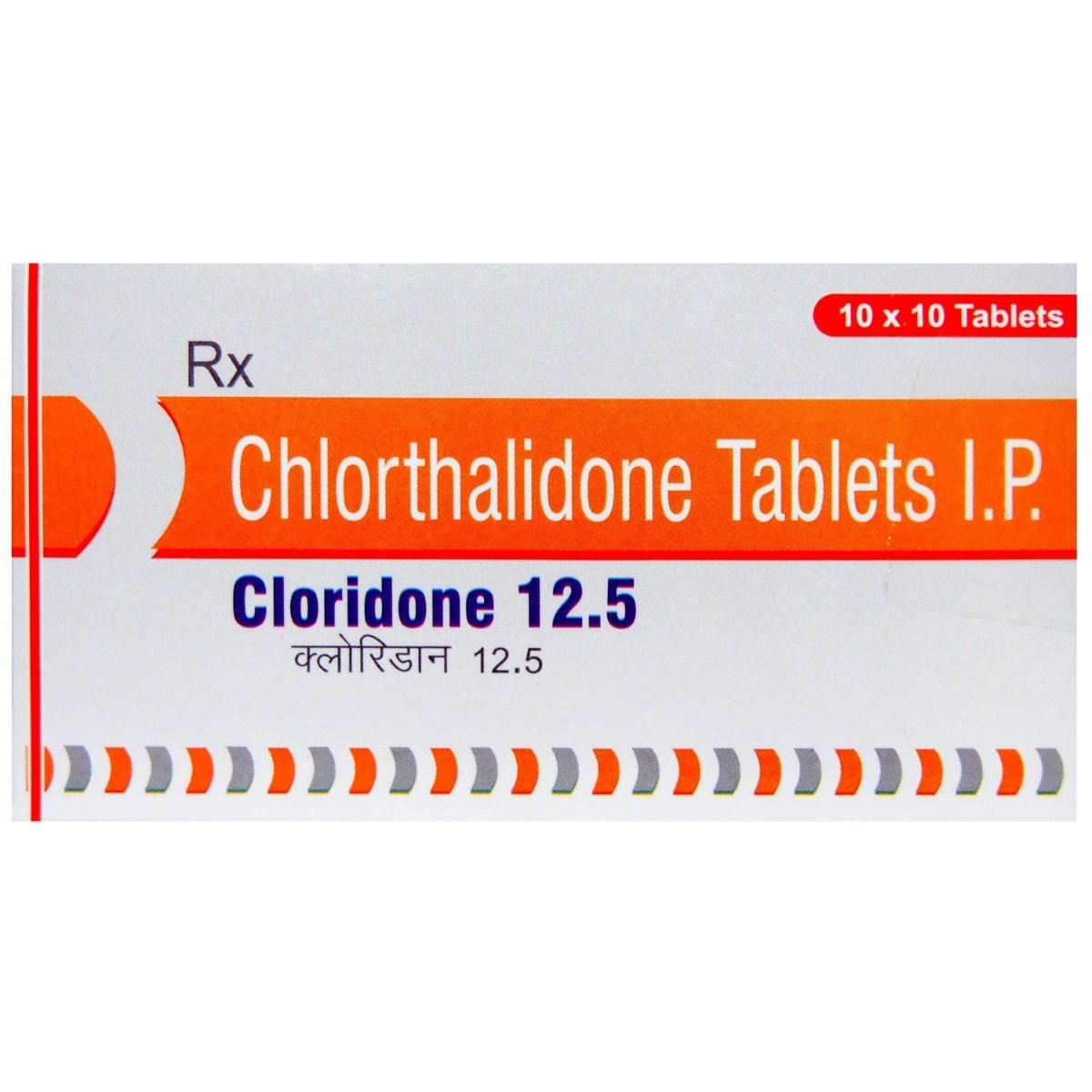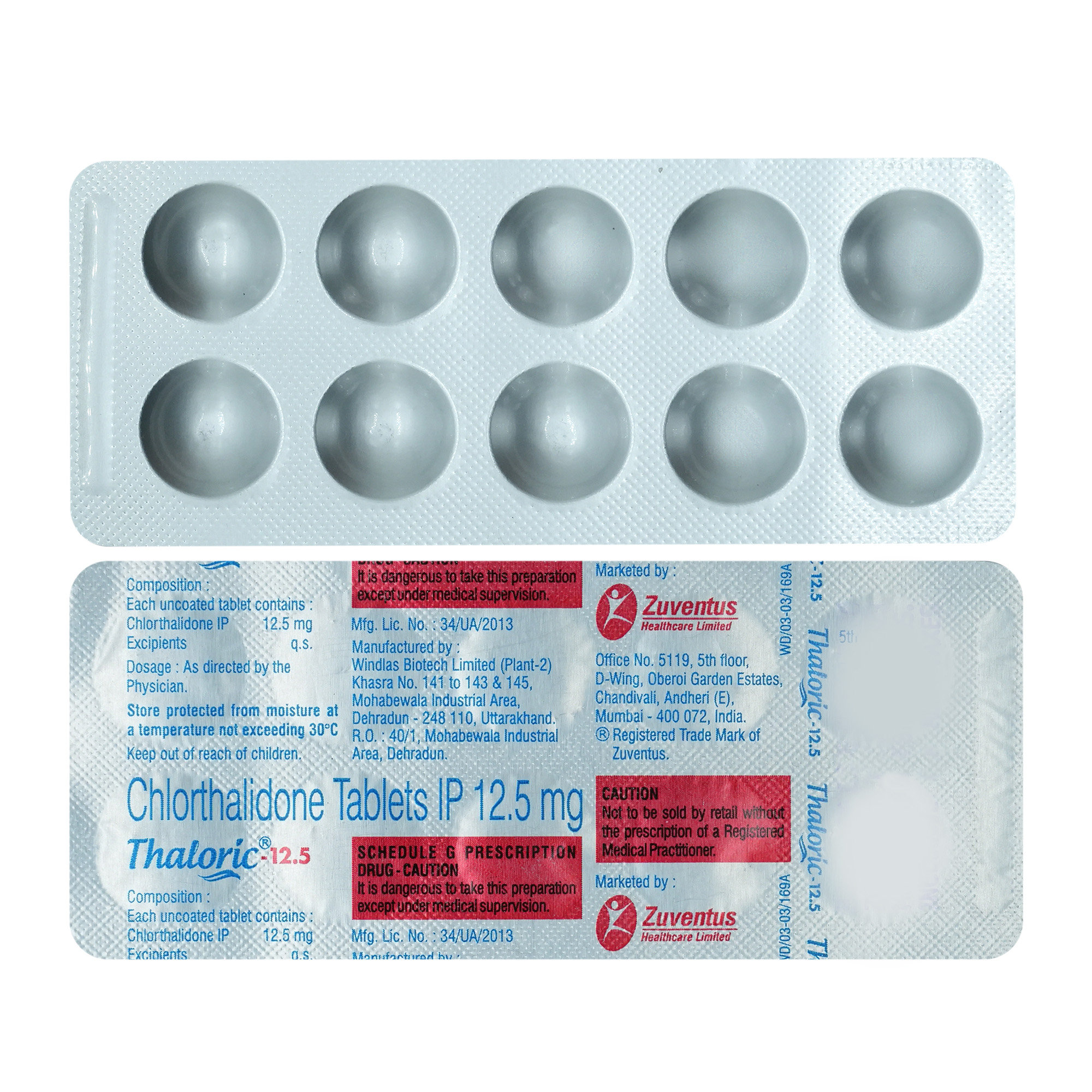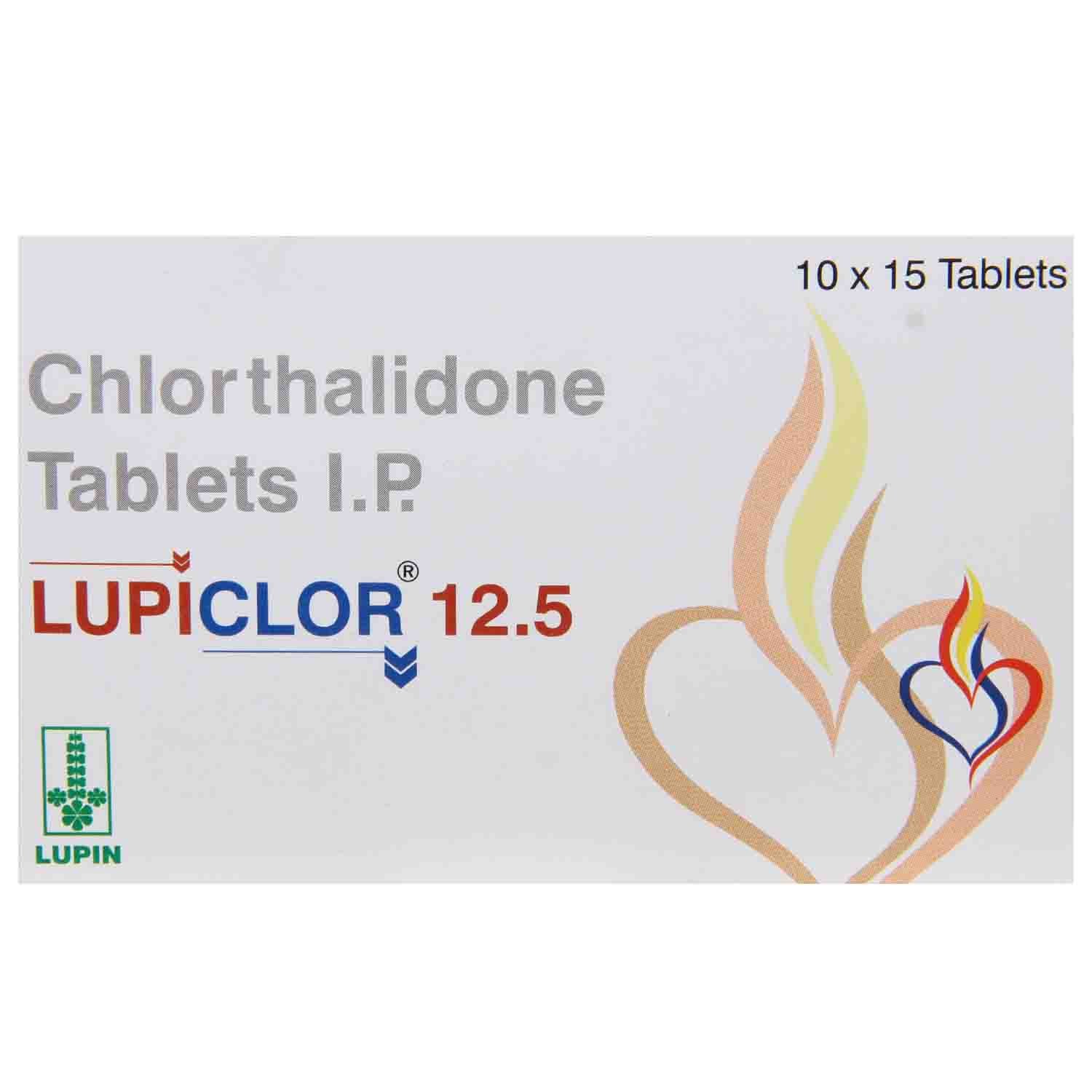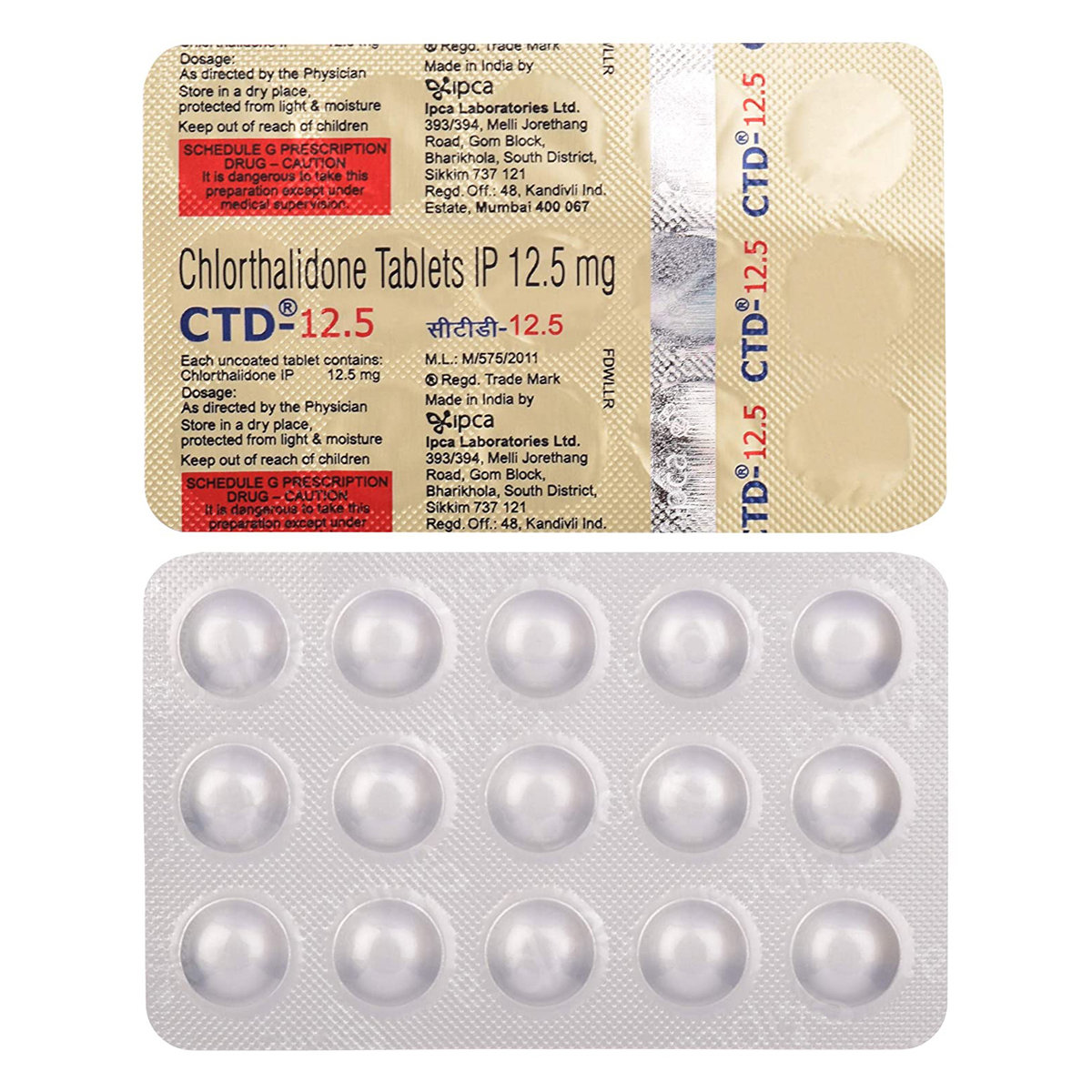Clothrol 12.5mg Tablet
MRP ₹67
(Inclusive of all Taxes)
₹10.1 Cashback (15%)
Provide Delivery Location
Online payment accepted
 Prescription drug
Prescription drugWhats That
About Clothrol 12.5mg Tablet
Clothrol 12.5mg Tablet belongs to a group of medicines known as diuretics (water pills which increase urine production) primarily used to treat high blood pressure, heart failure, and oedema (a build-up of fluid in the body). Hypertension or high blood pressure is a lifelong or chronic condition in which the force exerted by the blood against the blood vessel (arteries wall) increases. The higher this blood pressure, the harder the heart has to pump. As a result, it leads to heart diseases, irregular heartbeat, and other complications. Oedema may occur in case of high blood pressure where fluids of the body get trapped in the tissues of the hands, arms, feet, ankles, and legs, leading to swelling.
Clothrol 12.5mg Tablet contains Chlorthalidone, and it works by increasing the amount of urine passed out from the kidneys. It effectively reduces excess fluid levels in the body and treats oedema (swelling) associated with heart, liver, kidney, or lung disease. This, in turn, reduces the workload on the heart and makes the heart more efficient at pumping blood throughout the body. So, it helps to lower high blood pressure, reducing the chances of heart attack or stroke.
In some cases, you may experience headaches, nausea, or dizziness. Most of these side effects of Clothrol 12.5mg Tablet do not require medical attention and gradually resolve over time. However, if the side effects are persistent, reach out to your doctor.
Try not to stop taking this medicine of your own. Tell your doctor about this, as it may cause a rise in blood pressure and can increase the risk of getting heart complications like stroke and heart diseases. Inform your doctor if you are suffering from kidney, liver, or heart disease or are diabetic. If you are pregnant or breastfeeding, please tell your doctor so that the dosage of Clothrol 12.5mg Tablet can be prescribed accordingly. Taking Clothrol 12.5mg Tablet during pregnancy may cause side effects like jaundice (yellowing of the skin or eyes), unexplained bleeding, low blood sugar, or an electrolyte imbalance in the newborn baby. Do not use Clothrol 12.5mg Tablet if you are unable to urinate, have low blood pressure (hypotension), gout (excess uric acid), high cholesterol (hyperlipidaemia), cardiogenic shock (sudden stopping of blood flow to the heart). Please tell your doctor if you are taking any other medicines or are allergic to this medicine. Reducing the amount of table salt (sodium chloride) in your food often relieves the swelling of the body.
Uses of Clothrol 12.5mg Tablet
Directions for Use
Key Benefits
When you take Clothrol 12.5mg Tablet, the blood vessels in your body will be relaxed, which will help lower the raised blood pressure. Also, it widens the blood vessels (lining of arteries wall) and helps to improve the blood flow. It helps in losing out excess fluids from the body by increasing the production of urine. This reduces the workload on the heart and makes the heart more efficient at pumping blood throughout the body. Thus, it helps to lower high blood pressure, reducing the chances of heart attack or stroke. Clothrol 12.5mg Tablet also helps decrease fluid buildup, which reduces inflammation or swelling. In addition, this relieves oedema and helps you carry out your daily activities more efficiently.
Storage
- Talk to your doctor about oral potassium supplements.
- Eat potassium rich foods such as bananas, avocados, oranges, dark leafy greens, beans and peas, fish, spinach, milk and tomatoes.
- Limit intake of full-fat dairy products, red meat and processed foods rich in saturated fats.
- Avoid foods with label “partially hydrogenated oils”.
- Eat more vegetables, fruits, oats, whole grains, lentils and beans to increase fiber intake.
- Include foods rich in monounsaturated fats like nuts, avocados, olive oil, and oily fish.
- Limit consumption of egg yolks.
- Exercise for at least 30 minutes 5 days a week.
- Aim for weight loss and maintain healthy weight.
- Quit smoking as smoking raises the risk of heart disease associated with cholesterol.
- Limit alcohol consumption as excessive drinking may raise cholesterol levels.
- If you experience low blood pressure symptoms like dizziness, lightheadedness, or fainting while taking medication, seek immediate medical attention.
- Make lifestyle modifications and adjust your medication regimen under medical guidance to manage low blood pressure.
- As your doctor advises, regularly check your blood pressure at home. Record your readings to detect any changes and share them with your doctor.
- Fluid intake plays a vital role in managing blood pressure by maintaining blood volume, regulating blood pressure, and supporting blood vessel function. Drinking enough fluids helps prevent dehydration, maintain electrolyte balance, and regulate fluid balance.
- Take regular breaks to sit or lie down if you need to stand for long periods.
- When lying down, elevate your head with extra pillows to help improve blood flow.
- Avoid heavy exercise or strenuous activities that can worsen low blood pressure.
- Wear compression socks as your doctor advises to enhance blood flow, reduce oedema, and control blood pressure.
- If symptoms persist or worsen, or if you have concerns about your condition, seek medical attention for personalized guidance and care.
- Quit smoking as smoking impairs erectile function by significantly damaging blood vessels.
- Maintain a healthy weight as overweight can cause erectile dysfunction.
- Exercise regularly as physical activity enhances blood flow and overall health, benefiting erectile function.
- Consume a healthy diet loaded with whole grains, fruits and vegetables.
- Limit alcohol consumption as excessive alcohol intake can impair erectile function.
- Manage stress by practicing techniques such as yoga, relaxation exercises or meditation.
- In case erectile dysfunction is due to psychological factors, consider couple counselling or sex therapy to address relationship and anxiety issues.
- Openly discuss your concerns with your partner.
- Inform your doctor about dizziness symptoms. They may adjust your medication regimen or prescribe additional medications to manage symptoms.
- Follow your doctor's instructions for taking medication, and take it at the same time every day to minimize dizziness.
- When standing up, do so slowly and carefully to avoid sudden dizziness.
- Avoid making sudden movements, such as turning or bending quickly, which can exacerbate dizziness.
- Drink plenty of water throughout the day to stay hydrated and help alleviate dizziness symptoms.
- If you're feeling dizzy, sit or lie down and rest until the dizziness passes.
- Track when dizziness occurs and any factors that may trigger it, and share this information with your doctor to help manage symptoms.
- Do not stand up suddenly. Lie down and get up slowly only when you feel better.
- Avoid alcohol and large meals.
- Drink enough water before standing for long periods.
- Exercise regularly; however, avoid exercising in extreme heat.
- Eat small, low-carb meals.
- Wear compression stockings.
Drug Warnings
Clothrol 12.5mg Tablet should not be given to the people allergic to Clothrol 12.5mg Tablet, have low blood pressure (less than 90 mm of Hg), have had a heart attack, kidney disease, liver disease, gout (high uric acid), high cholesterol (hyperlipidemia), pregnant women, or planning to get pregnant and breastfeeding women. Besides this, it is contraindicated in people with cardiogenic shock (sudden stopping of blood flow to the heart), and aortic stenosis (heart valve problem). Clothrol 12.5mg Tablet can pass into breast milk, but its effect on the baby is unknown. So, it is better to tell your doctor if you are taking Clothrol 12.5mg Tablet and breastfeeding. Tell your doctor if you are on low sodium (table salt) diet. Cases of electrolyte imbalance have been observed (like low levels of sodium, potassium, or magnesium in your blood). So your doctor might advise monitoring blood pressure, kidney function test, and electrolytes.
Drug-Drug Interactions
Drug-Drug Interactions
Login/Sign Up
Co-administration of Clothrol 12.5mg Tablet and cisapride may increase the risk or severity of an irregular heart rhythm that may be serious.
How to manage the interaction:
Taking Clothrol 12.5mg Tablet with Cisapride is not recommended, please consult your doctor before taking it. Do not discontinue the medication without consulting a doctor.
Co-administration of Aminolevulinic acid and Clothrol 12.5mg Tablet may increase the risk of severe sunburn.
How to manage the interaction:
Taking Clothrol 12.5mg Tablet with Aminolevulinic acid together can possibly result in an interaction, but it can be taken if a doctor has advised it. If you notice that your skin is very sensitive to sunlight or if you have a really bad sunburn, it's important to contact your doctor right away. Do not discontinue any medications without consulting a doctor.
Taking Droperidol can make Clothrol 12.5mg Tablet less effective in lowering blood pressure.
How to manage the interaction:
Taking Clothrol 12.5mg Tablet with Droperidol together can possibly result in an interaction, but it can be taken if your doctor has advised it. If you have any of these symptoms, it's important to contact your doctor right away. These symptoms include an irregular heart rhythm, severe or long-lasting diarrhea or vomiting, complications, sudden dizziness or lightheadedness, fainting, difficulty breathing, heart palpitations, weakness, feeling sleepy or confused, muscle pain, and feeling nauseous or vomiting. Do not stop using any medications without first talking to your doctor.
Co-administration of Clothrol 12.5mg Tablet together with lithium can increase the effects of lithium.
How to manage the interaction:
Although there is a interaction between Clothrol 12.5mg Tablet and lithium, but it can be taken together if prescribed by a doctor. However, consult your doctor if you experience diarrhea, vomiting, drowsiness, shaking of hands and legs, thirst, increased urination, lack of coordination, or muscle weakness. Do not discontinue any medications without consulting a doctor.
Co-administration of Tizanidine and Clothrol 12.5mg Tablet may show additive effects and increase the risk of low blood pressure.
How to manage the interaction:
Although there is an interaction, Clothrol 12.5mg Tablet can be taken with tizanidine if prescribed by the doctor. If you experience headache, dizziness, palpitations, or sweating, contact your doctor immediately. Do not discontinue any medications without consulting a doctor.
Co-administration of Clothrol 12.5mg Tablet with ziprasidone can increase the risk of an irregular heart rhythm that may be serious.
How to manage the interaction:
Although there is an interaction, Clothrol 12.5mg Tablet can be taken with ziprasidone if prescribed by the doctor. but it can be taken together if prescribed by a doctor. However, consult your doctor if you experience sudden dizziness, lightheadedness, fainting, shortness of breath, weakness, tiredness, drowsiness, confusion, muscle pain, cramps, nausea, or vomiting. Do not discontinue any medications without consulting a doctor.
Co-administration of Clothrol 12.5mg Tablet with pimozide can increase the risk of an irregular heart rhythm that may be serious.
How to manage the interaction:
Although there is an interaction, Clothrol 12.5mg Tablet can be taken with pimozide if prescribed by the doctor. Consult the prescriber if you develop sudden dizziness, lightheadedness, fainting, or fast or pounding heartbeats during treatment with pimozide. Also, let the doctor know if you experience signs of electrolyte disturbance, such as weakness, tiredness, drowsiness, confusion, muscle pain, cramps, dizziness, nausea, or vomiting. Do not discontinue any medications without consulting a doctor.
Coadministration of Clothrol 12.5mg Tablet with amiodarone may increase the risk of abnormal heart rhythms.
How to manage the interaction:
Although taking Clothrol 12.5mg Tablet with amiodarone may cause an interaction, it is safe to do so if your doctor has prescribed it. If you have a cardiac problem or electrolyte imbalances, you may be more vulnerable. If you develop sudden dizziness, lightheadedness, fainting, shortness of breath, or a rapid heartbeat, consult a doctor. Do not stop taking any medications without visiting a doctor.
Taking Clothrol 12.5mg Tablet can make the body eliminate Arsenic trioxide faster, leading to lower levels in the blood and potentially reducing its effectiveness.
How to manage the interaction:
Co-administration of Clothrol 12.5mg Tablet with Arsenic trioxide can possibly result in an interaction, but it can be taken if a doctor has advised it. If you have any of these symptoms, it's important to contact a doctor right away: your heart beating irregularly, feeling dizzy or lightheaded, fainting, having a fast or pounding heartbeat, feeling weak or drowsy, being confused, experiencing muscle pain, or feeling nauseous or vomiting. Do not discontinue any medications without consulting a doctor.
Drug-Food Interactions
Drug-Food Interactions
Login/Sign Up
Diet & Lifestyle Advise
- Consume antioxidant-rich food. Blueberries, cherries, tomatoes, squash, and bell peppers are high in antioxidants.
- Eat natural diuretic foods. Asparagus, beets, green beans, grapes, onion, leafy greens, pineapple, leeks, pumpkin, and garlic are all-natural diuretic foods.
- Use healthy cooking oils like soybean, olive, canola, and coconut oil.
- You should avoid refined foods such as white bread, spaghetti, sugar, and red meat.
- Reduce or eliminate Trans fatty acids, which are found in commercially baked items such as cookies, cakes, crackers, French fries, onion rings, doughnuts, and processed foods.
- Avoid consumption of too much salt or salty food.
- Keep your weight under control with a BMI of 19.5-24.9.
- Regular physical activity or exercise like walking improves your blood flow.
- When possible, elevate your legs or the swollen area on a chair or pillows.
- Avoid standing or sitting for extended periods of time.
- Avoid chronic stress as it can raise your blood pressure.
- Spend time with your loved ones to cope with stress and practice mindfulness techniques.
- Quitting smoking and alcohol consumption is the best strategy to lower the risk of many health complications.
Side Effects of Clothrol 12.5mg Tablet
- Bradycardia (slow heart rate)
- Hyperglycemia
- Hyperuricemia (an excess of uric acid in the blood)
- Muscle spasm
- Nausea
- Extreme tiredness
Habit Forming
Therapeutic Class
All Substitutes & Brand Comparisons
RX
Out of StockChlohat 12.5mg Tablet
Akesiss Pharma Pvt Ltd
₹33.33
(₹3.0 per unit)
50% CHEAPERRX
Out of StockCtjoy 12.5mg Tablet
₹40
(₹3.6 per unit)
40% CHEAPERRX
Out of StockChlorthed 12.5 Tablet
Prevego Healthcare & Research Pvt Ltd
₹45
(₹4.05 per unit)
32% CHEAPER
Author Details
We provide you with authentic, trustworthy and relevant information
Drug-Diseases Interactions
Drug-Diseases Interactions
Login/Sign Up
Thiazide diuretics should not be used in people who have anuria.
How to manage the interaction:
Clothrol 12.5mg Tablet is contraindicated in patients with anuria.
Thiazide diuretics should not be used in people who have anuria.
How to manage the interaction:
Clothrol 12.5mg Tablet is contraindicated in patients with anuria.
Thiazide diuretics are usually associated with electrolyte loss, most notably potassium, but also sodium, chloride, bicarbonate, and magnesium. Other electrolytes, such as phosphate, bromide, and iodide, are normally lost in trace amounts. Potassium and magnesium deficiency can cause arrhythmias and cardiac arrest. Metabolic alkalosis and hyponatremia are two other electrolyte-related disorders that are seldom fatal.
How to manage the interaction:
Therapy with Clothrol 12.5mg Tablet should be administered cautiously in patients with or predisposed to fluid and electrolyte depletion. Fluid and electrolyte abnormalities should be corrected before initiating therapy, and blood pressure and serum electrolyte concentrations should be monitored periodically and maintained at normal ranges during therapy. Consult the doctor if you experience signs and symptoms of fluid or electrolyte imbalance, including dry mouth, thirst, weakness, lethargy, drowsiness, restlessness, muscle pains or cramps, muscular fatigue, hypotension, oliguria, tachycardia, arrhythmia, or gastrointestinal disturbances such as nausea and vomiting.
Thiazide-induced hypokalemic hypochloremic alkalosis is especially dangerous in patients with severe liver disease or cirrhosis. In individuals with already elevated amounts, blood ammonia levels may rise further. Electrolyte changes associated with diuretic usage have resulted in hepatic encephalopathy and mortality. Thiazide diuretic therapy should be used with caution in patients with poor hepatic function or progressive liver disease, and should be stopped immediately if indications of imminent hepatic coma occur (e.g., tremors, disorientation, and increasing jaundice).
How to manage the interaction:
Therapy with Clothrol 12.5mg Tablet should be administered cautiously in patients with impaired liver function or progressive liver disease, and discontinued promptly if signs of impending hepatic coma appear.
Thiazide diuretics have been reported to worsen or activate systemic lupus erythematosus. Chlorothiazide and hydrochlorothiazide have been linked to reported instances. Thiazide diuretics should be used with caution in individuals having a history or risk of SLE.
How to manage the interaction:
The use of Clothrol 12.5mg Tablet has been reported to possibly exacerbate or activate systemic lupus erythematosus (SLE). Therapy with thiazide diuretics should be administered cautiously in patients with a history or risk of SLE.
Thiazide diuretics may be ineffective when the glomerular filtration rate (GFR) is low (less than 25 mL/min) because they are not expected to be filtered into the renal tubule, where they work. Furthermore, thiazide diuretics lower GFR and may cause azotemia in patients with renal failure. Because most of these medicines are eliminated unaltered in the urine through glomerular filtration and active tubular secretion, cumulative effects may occur. Thiazide diuretic therapy should be used with caution and at lower doses in individuals with renal impairment. If renal function worsens over time, as shown by increased BUN or serum creatinine levels, thiazide medication should be interrupted or discontinued.
How to manage the interaction:
Therapy with Clothrol 12.5mg Tablet should be administered cautiously at reduced dosages in patients with kidney impairment.
Thiazide diuretics should be administered with caution in individuals with a history of bronchial asthma because to the possibility of hypersensitive responses.
How to manage the interaction:
Clothrol 12.5mg Tablet should be used with caution in patients with history of bronchial asthma as sensitivity reactions may occur.
Thiazide diuretics can induce hyperglycemia and glycosuria in diabetics. They can also cause diabetes in pre-diabetic persons. These symptoms are normally reversible if the medicines are stopped. Thiazide diuretic therapy should be used with caution in individuals with diabetes, glucose intolerance, or a propensity to hyperglycemia. Diabetes mellitus patients should be regularly watched during thiazide medication, and their antidiabetic regimen should be changed accordingly.
How to manage the interaction:
Clothrol 12.5mg Tablet may cause high blood sugar levels and glycosuria (glucose in the urine) in patients with diabetes. Therapy with Clothrol 12.5mg Tablet should be administered cautiously in patients with diabetes mellitus, glucose intolerance, or a predisposition to high blood sugar levels. Patients with diabetes mellitus should be monitored more closely during therapy.
Thiazide diuretics may raise blood triglyceride and cholesterol levels, particularly LDL and VLDL. It is uncertain if these effects are dose-related and persist throughout chronic treatment. Patients with pre-existing hyperlipidemia may require stricter monitoring during thiazide medication, and their lipid-lowering regimen may need to be adjusted accordingly.
How to manage the interaction:
Clothrol 12.5mg Tablet may increase serum triglyceride and cholesterol levels, primarily low-density lipoprotein and very low-density lipoprotein. Patients with preexisting hyperlipidemia may require closer monitoring during thiazide therapy.
Thiazide diuretics reduce urinary calcium excretion when used on a long-term basis. Prolonged treatment has been associated with pathologic alterations in the parathyroid gland, including hypercalcemia and hypophosphatemia. However, typical hyperparathyroidism consequences such as renal lithiasis, bone resorption, and peptic ulcers have not been observed. Clinicians should be aware of these side effects while prescribing or providing thiazide medication to hyperparathyroid patients. These medications should be stopped before doing parathyroid function testing.
How to manage the interaction:
Caution is advised while using Clothrol 12.5mg Tablet in patients with hyperparathyroidism.
Thiazide diuretics slow the excretion of uric acid. Except in patients with a history of gout or chronic renal failure, hyperuricemia is typically asymptomatic and seldom progresses to clinical gout. Thiazide diuretic therapy should be used with caution in such individuals.
How to manage the interaction:
Clothrol 12.5mg Tablet may decrease the rate of uric acid excretion. Therapy should be administered cautiously in such patients.
Thiazide diuretics may lower serum PBI (protein-bound iodine) levels without causing thyroid problems. When prescribing or providing thiazide medication to patients with thyroid problems, clinicians should be aware of this consequence.
How to manage the interaction:
Thiazide diuretics may decrease serum PBI (protein-bound iodine) levels without associated thyroid disturbance. Inform the prescriber if you have thyroid disorders.
FAQs
Drug-Drug Interactions Checker List
- METOPROLOL
- RAMIPRIL
- HYDROCHLOROTHIAZIDE
- ATORVASTATIN
- SILDENAFIL
- CARBAMAZEPINE
- PHENOBARBITAL
- IBUPROFEN
- ASPIRIN
Special Advise
If you have taken high doses drink more water and Consult your doctor immediately.
Disease/Condition Glossary
Hypertension: It is a chronic condition when blood pressure is too high. This condition can lead to hardened arteries (blood vessels), decreasing the blood and oxygen flow to the heart. Blood pressure is the measurement of the force our heart uses to pump blood to all body parts. Raised blood pressure can cause chest pain (angina) and heart attack (when blood supply to the heart is blocked). Additionally, high blood pressure also causes brain damage (stroke) and kidney failure. High blood pressure can be diagnosed with the help of a blood pressure monitor or sphygmomanometer. Systolic pressure is the pressure when the heart pumps blood out. On the other hand, diastolic pressure is the pressure when your heart is at the resting stage between heartbeats. If your blood pressure is 140/90 mm of Hg, it means the systolic pressure is 140 mm of Hg and diastolic pressure is 90 mm of Hg. Ideal blood pressure should be between 90/60 mm of Hg and 120/80 mm of Hg.
Oedema: Also known as 'dropsy' or 'hydropsy', is a condition of fluid retention in the body characterized by swelling of the body's tissue, including ankles, feet and legs. It is usually caused by standing or sitting in the same position for too long, eating too much salty food, and being overweight. Oedema mainly affects the lymphatic system (including the circulatory and immune system) and organs like the tonsils, spleen, and thymus that maintain fluid balance and fight infections.

Have a query?
Alcohol
Safe if prescribed
You are recommended not to consume alcohol along with Clothrol 12.5mg Tablet to avoid unpleasant side-effects.
Pregnancy
Consult your doctor
Clothrol 12.5mg Tablet is classified as FDA pregnancy risk category B. So, Clothrol 12.5mg Tablet should not be used during pregnancy unless clearly necessary. Prolonged intake of Clothrol 12.5mg Tablet during pregnancy may cause jaundice (yellowing of skin and eye), unexplained bruising, low blood sugar and electrolyte imbalance in the neonates (newborn baby). Your doctor will weigh the benefits and any potential risks before prescribing it to you. Please consult your doctor.
Breast Feeding
Consult your doctor
Clothrol 12.5mg Tablet should not be used when breastfeeding unless clearly necessary. Your doctor will weigh the benefits and any potential risks before prescribing it to you. Please consult your doctor.
Driving
Safe if prescribed
Driving after taking Clothrol 12.5mg Tablet is not recommended as it may occasionally cause drowsiness.
Liver
Consult your doctor
Clothrol 12.5mg Tablet to be taken with caution, especially if you have a history of liver diseases/conditions. The dose may have to be adjusted by your doctor.
Kidney
Consult your doctor
Clothrol 12.5mg Tablet to be taken with caution, especially if you have a history of kidney diseases/conditions. Your doctor may adjust your dose depending upon your current kidney conditions.
Children
Safe if prescribed
Clothrol 12.5mg Tablet to be taken with caution, especially if you are children below the age of 12. Your doctor may adjust your dose depending upon your age.













